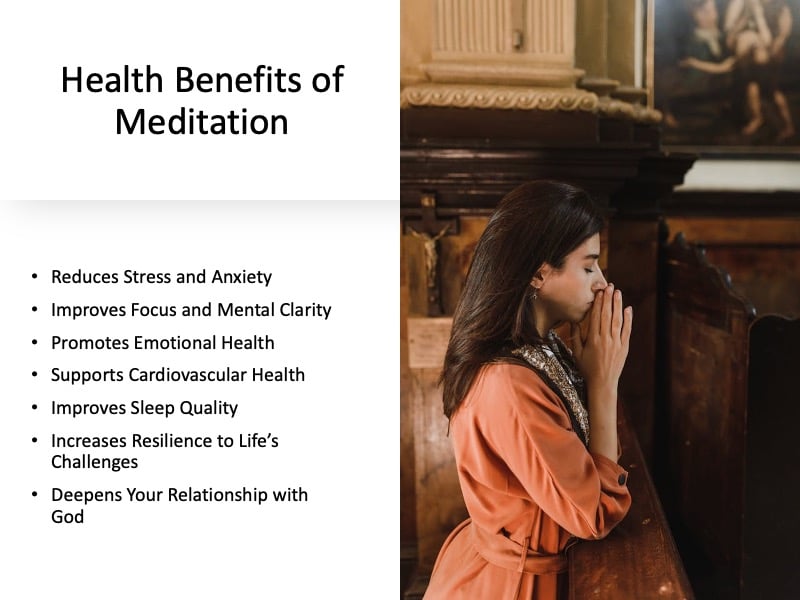Meditation: What it Is, Benefits, How to Do & More!
Meditation is more than just a trend or wellness hack, it’s a powerful tool for improving mental focus, reducing stress, and promoting spiritual growth.
Although often associated with secular mindfulness or Eastern spirituality, meditation can be practiced in a way that aligns with Christian beliefs and draws you closer to God’s truth and purpose.
By learning how to meditate properly, you can calm your nervous system, build emotional resilience, and renew your mind, without relying on pagan rituals or New Age philosophies.
Whether you’re exploring meditation for the first time or want to refine your practice with a Christ-centered focus, this guide will explain what meditation really is, the proven benefits it offers, how to do it effectively, and how apps can seamlessly support your journey when used with discernment.
Let’s explore how meditation can strengthen both your faith and your well-being!
What Is Meditation?

Meditation is the practice of focused attention and intentional contemplation.
It involves silencing distractions to reflect deeply, preferably on Scripture, prayer, or God’s nature.
While secular or pagan meditation often encourages “emptying the mind,” biblical meditation is about filling the mind with truth.
As Psalm 1:2 says, “But his delight is in the law of the Lord, and on his law he meditates day and night.”
This type of meditation is not about detaching from reality but instead immersing yourself in God’s truth.
Health Benefits of Meditation

Meditation offers physical and mental health benefits that are well-documented by research.
When practiced in a God-honoring way, meditation supports holistic well-being.
1.) Reduces Stress and Anxiety
Meditation significantly lowers cortisol levels and reduces the overstimulation of the sympathetic nervous system, which is responsible for the body’s “fight or flight” response (Pascoe et al., 2017).
This makes it a practical, science-backed method for managing daily stressors and avoiding chronic stress burnout.
From a Christian perspective, meditating on God’s promises brings peace that surpasses understanding, offering reassurance and calm in place of anxiety.
2.) Improves Focus and Mental Clarity
Consistently practices meditation improves attention span, working memory, and cognitive flexibility (Tang et al., 2007).
In a world overloaded with distractions, meditation offers a reset, anchoring your thoughts in what is pure, noble, and praiseworthy.
This focus builds discipline and supports stronger decision-making aligned with your values.
3.) Promotes Emotional Health
Meditation helps reduce symptoms of depression and fosters emotional stability by promoting healthier brain patterns and better emotional regulation (Goyal et al., 2014).
When anchored in biblical truth, it becomes more than mood management, it becomes a path toward healing and restoration.
Christian meditation aligns with the fruit of the Spirit, helping cultivate joy, peace, and self-control.
4.) Supports Cardiovascular Health
Physiological studies have shown that meditation reduces blood pressure, improves heart rate variability, and helps lower systemic inflammation (Brook et al., 2013).
These changes contribute to a lower risk of cardiovascular disease and better long-term heart health.
5.) Improves Sleep Quality
Meditation before bedtime has been shown to reduce nighttime rumination and calm the nervous system, allowing for deeper and more restorative sleep (Black et al., 2015).
Christians who end their day by meditating on God’s faithfulness often find emotional closure and peace that helps them sleep soundly.
A nightly habit of quiet reflection or listening to Scripture-based meditation can transform rest into a sacred practice.
6.) Increases Resilience to Life’s Challenges
Learning how to embrace impermanence is one of the most powerful ways to positively impact your life.
Meditation cultivates mental resilience by helping you stress less when problems arise, build emotional regulation, and develop self-awareness.
Spiritually, it trains believers to pause, pray, and reflect before reacting, even during trials.
This practice builds the inner strength needed to persevere with grace and faith, echoing Romans 12:12—“Be joyful in hope, patient in affliction, faithful in prayer.”
7.) Deepens Your Relationship with God
Christian meditation isn’t about detachment—it’s about connection.
By regularly meditating on Scripture, you create space for the Holy Spirit to speak, reveal, and guide your thoughts.
As Joshua 1:8 reminds us, consistent meditation on God’s Word strengthens faith, builds spiritual maturity, and helps you walk in obedience.
Common Mistakes to Avoid in Meditation
Meditation can offer profound mental, emotional, and spiritual benefits—but it’s important to approach it with the right mindset.
Misguided approaches can make meditation feel ineffective or even disconnected from your deeper values. Here are a few common mistakes to be aware of:
Treating Meditation as Just Another Productivity Hack
Meditation is not meant to be another tool to “optimize” your day or squeeze more out of yourself.
When it’s reduced to a performance enhancer, it can lose its deeper value. Instead, approach meditation as a space to slow down, reconnect with your inner life, and, if you’re a person of faith, realign with your spiritual purpose and calling.
Overrelying on Meditation Apps
While apps like Calm or Headspace are helpful for building consistency and learning technique, they often offer content shaped by secular or Eastern worldviews.
If you’re using these tools, be intentional about the type of content you engage with.
For those who value a biblical or faith-driven perspective, it’s helpful to balance or replace app-based meditations with reflective reading, prayer, or Scripture-centered prompts to stay spiritually grounded.
Using Affirmations That Conflict with Core Beliefs
Many popular meditations use affirmations like “I am enough” or “the universe is guiding me,” which may feel uplifting but can subtly promote a self-centered or abstract spiritual philosophy.
If you come from a Christian background, it’s more meaningful to meditate on truths that reflect your identity in God, for example, “I am fearfully and wonderfully made” or “I have peace through Christ.”
Choose affirmations that reinforce humility, purpose, and truth.
How to Meditate

You don’t need incense, chants, or “third eye” visualization to meditate.
Whether you have five minutes or thirty, learning how to meditate can bring lasting peace and spiritual clarity.
- Step 1: Choose a Passage or Topic: Start with a verse, such as Psalm 23 or Romans 8. You may also reflect on a theme like grace, forgiveness, or obedience.
- Step 2: Find a Quiet Place: Create an environment with limited distractions. You don’t need elaborate rituals. Sit comfortably, close your eyes if helpful, and take a few deep breaths.
- Step 3: Focus Your Mind on God: Repeat the verse slowly. Visualize its meaning. Pray over the words. Ask the Holy Spirit to reveal insights or direction. Keep your heart focused on the Lord, not on abstract ideas or “energy.”
- Step 4: Listen and Be Still: Meditation isn’t only about speaking, it’s about listening. Allow space for God to speak to your spirit. This moment of stillness is sacred, not empty.
- Step 5: Close in Gratitude: Finish your session with a short prayer of thanks and a commitment to walk in what you’ve received. Journaling your thoughts afterward can reinforce clarity and accountability.
Meditation Apps – A Useful Tool
Apps like Calm, Headspace, or Insight Timer can be useful for learning the mechanics of meditation, like breathing, posture, or focus.
However, these apps often include content influenced by New Age or Eastern philosophies.
If you choose to use these tools, do so discerningly.
Skip meditations that reference chakras, universal energy, or non-Christian affirmations.
Instead, look for content labeled as “Christian meditation” or create your own sessions guided by Scripture and prayer.
Alternatively, explore Christian meditation apps such as:
- Abide – Offers guided Bible-based meditations, bedtime stories, and prayer prompts.
- Soultime – Combines Scripture with mental wellness tools.
- Dwell – Helps you meditate on Scripture through beautiful audio narration.
How to Create a Daily Meditation Routine
Building a consistent meditation routine doesn’t require hours of free time or a perfect environment, it simply requires intention.
A daily rhythm of meditating on God’s Word can ground your thoughts, renew your spirit, and reinforce your faith through life’s challenges.
Sample Morning Meditation Template
- Time Needed: 5–10 minutes
- Step 1: Read a short Scripture passage (e.g., Psalm 5:3 or Lamentations 3:22–23).
- Step 2: Reflect quietly on what God is saying.
- Step 3: Ask God to prepare your heart and mind for the day.
- Step 4: Close with a prayer of gratitude and surrender.
This type of morning meditation sets a tone of peace and focus, allowing you to face the day with spiritual clarity and direction.
Sample Evening Meditation Template
- Time Needed: 10–15 minutes
- Step 1: Read a verse that speaks to rest, reflection, or God’s protection (e.g., Psalm 4:8 or Matthew 11:28–30).
- Step 2: Think about the highs and lows of your day through the lens of God’s presence.
- Step 3: Invite the Holy Spirit to reveal any areas for growth or repentance.
- Step 4: End with a prayer of release and peace before sleep.
Evening meditation is especially helpful for reducing mental noise and promoting restorative rest.
Journaling Prompts for Post-Meditation Reflection
- “What did I sense God speaking to me during this time?”
- “What truth do I need to carry into the rest of my day?”
- “What thought patterns do I need to renew or let go of?”
- “How did today’s Scripture impact my perspective or emotions?”
Journaling reinforces the insights gained during meditation, helping to solidify spiritual growth and emotional clarity.
Habit-Stacking Ideas
- Pair morning meditation with your first cup of coffee or after brushing your teeth.
- Combine meditation with prayer walks or quiet time before workouts.
- Add it to your Bible study or devotional time as a moment of stillness and reflection.
The goal is to anchor meditation into existing rhythms, making it a life-giving habit instead of a forced task.
Final Thoughts: How to Use Meditation to Transform the Mind and Spirit

Meditation, when practiced intentionally, is one of the most powerful tools for transforming both the mind and spirit.
It creates a sacred pause in our daily routines; a moment to shift from chaos to clarity, from fear to faith.
The science is clear: regular meditation can reduce stress hormones, lower blood pressure, improve sleep quality, and enhance focus and emotional regulation (Pascoe et al., 2017; Goyal et al., 2014; Black et al., 2015).
These physical and mental health benefits create fertile ground for spiritual growth, allowing your body and mind to function in harmony with God’s design.
More importantly, Christian meditation helps renew your mind, drawing you deeper into a relationship with God and equipping you to face life with peace, purpose, and perseverance (Romans 12:2).
By meditating on Scripture and listening for the Holy Spirit, you train your thoughts to align with truth and strengthen your ability to walk in faith, even in the face of adversity.
In a culture filled with noise and distraction, choosing to meditate is an act of obedience and surrender.
In that quiet space, transformation begins.
This website does not provide medical advice. This website site does contain affiliate links, and purchases may earn a commission.
Read my Medical Disclaimer, Review Disclaimer, and Publishing Policies for more details. Use of this site indicates acceptance of these terms.



